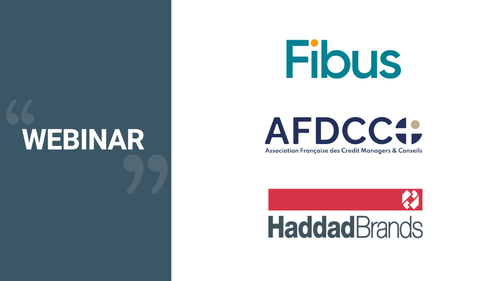

• To begin, can you give us your definition of innovation?
Innovation does not replace intelligence; it serves it. By eliminating repetitive, time-consuming, complex tasks that add no real value, innovation allows Credit Managers or Treasurers to dedicate more time to what they do best: anticipate, analyse, and then decide.
There are two perspectives on innovation: the technical aspect, which comes to mind first, and the professional aspect, which is the most important.
Technically, innovation is the ability to make a complex, error-prone, and time-consuming process simple, safe, and fast. At Fibus Digital, all our software solutions aim for this: the Credit Manager and/or the Treasurer must be able to experience significant time and performance gains in their daily tasks.
Technical innovation will be the foundation upon which they can rely to enhance their professional expertise. This is the true purpose of innovation: to better exercise and showcase one's skills within the company.
For a Credit Manager, innovation comprises all the tools that will help improve their understanding of their clients, enabling them to better anticipate risks and implement a relevant credit policy.
There are two perspectives on innovation: the technical aspect, which comes to mind first, and the professional aspect, which is the most important.
Technically, innovation is the ability to make a complex, error-prone, and time-consuming process simple, safe, and fast. At Fibus Digital, all our software solutions aim for this: the Credit Manager and/or the Treasurer must be able to experience significant time and performance gains in their daily tasks.
Technical innovation will be the foundation upon which they can rely to enhance their professional expertise. This is the true purpose of innovation: to better exercise and showcase one's skills within the company.
For a Credit Manager, innovation comprises all the tools that will help improve their understanding of their clients, enabling them to better anticipate risks and implement a relevant credit policy.
• In the offering you provide, how can we talk about major innovation and how does it translate operationally for the company or the credit teams?
ARI Trade maximises the potential of factoring by revealing to the Finance team the funding pockets that are still available and quickly activatable, ensuring the company is never underfinanced.
By combining the management and optimisation of factoring programmes and credit insurance policies into one dashboard, ARI Trade facilitates dialogue between Treasury and Credit Management. What used to be handled in two separate processes, requiring manual reconciliations, is now achievable with a single click.
Moreover, in most companies with multiple entities, especially those operating internationally, it is difficult to have a consolidated and real-time view of what factoring, managed by Treasurers, produces, and the level of client risk, managed by Credit Managers.
With ARI Trade, the CFO benefits from a consolidated view of the company’s cash flow across all subsidiaries: what is the turnover ceded to factors? Are there eligible clients outside the programme who could be included? Has the credit insurer responded to the request to improve a certain coverage rate, and what is the impact on the group’s cash flow?
By combining the management and optimisation of factoring programmes and credit insurance policies into one dashboard, ARI Trade facilitates dialogue between Treasury and Credit Management. What used to be handled in two separate processes, requiring manual reconciliations, is now achievable with a single click.
Moreover, in most companies with multiple entities, especially those operating internationally, it is difficult to have a consolidated and real-time view of what factoring, managed by Treasurers, produces, and the level of client risk, managed by Credit Managers.
With ARI Trade, the CFO benefits from a consolidated view of the company’s cash flow across all subsidiaries: what is the turnover ceded to factors? Are there eligible clients outside the programme who could be included? Has the credit insurer responded to the request to improve a certain coverage rate, and what is the impact on the group’s cash flow?
• Do you think some innovations will replace humans in certain roles? If not, how is innovation a tool that will improve the work and quality of life of the company’s employees?
Data itself is worthless; its value comes from how we use it.
Innovation, especially AI, will not replace humans but will allow them - without forcing them - to work differently. AI should be seen as an opportunity, not as an overwhelming force against which we are powerless. Freed from repetitive, low-value tasks, employees can focus their efforts on their core competencies.
For example, automatic reminder tools now handle the majority of collections, allowing the Credit Manager to focus only on major delinquents or cases where human intervention is necessary.
A human understanding of a problem, on a case-by-case basis, with our unique interpretative finesse and intuition, can never be replaced by a machine, and thankfully so!
To add to my previous point: innovation should not only serve intelligence but also restore human interaction in our professions, with all the necessary time for these exchanges to develop. Innovation should give us back time: time to think and time to converse.
Another very interesting dimension of innovation is its ability to allow us to work with more depth on certain subjects and with greater perspective on others.
In-depth, because the richness of the analysis provided by tools and AI will highlight unsuspected details that, exploited by the Credit Manager, will lead to increasingly targeted improvements.
In perspective, because reports generated by new tools like ARI Trade provide a consolidated view, enabling better anticipation of major trends and making sound strategic decisions.
Innovation, especially AI, will not replace humans but will allow them - without forcing them - to work differently. AI should be seen as an opportunity, not as an overwhelming force against which we are powerless. Freed from repetitive, low-value tasks, employees can focus their efforts on their core competencies.
For example, automatic reminder tools now handle the majority of collections, allowing the Credit Manager to focus only on major delinquents or cases where human intervention is necessary.
A human understanding of a problem, on a case-by-case basis, with our unique interpretative finesse and intuition, can never be replaced by a machine, and thankfully so!
To add to my previous point: innovation should not only serve intelligence but also restore human interaction in our professions, with all the necessary time for these exchanges to develop. Innovation should give us back time: time to think and time to converse.
Another very interesting dimension of innovation is its ability to allow us to work with more depth on certain subjects and with greater perspective on others.
In-depth, because the richness of the analysis provided by tools and AI will highlight unsuspected details that, exploited by the Credit Manager, will lead to increasingly targeted improvements.
In perspective, because reports generated by new tools like ARI Trade provide a consolidated view, enabling better anticipation of major trends and making sound strategic decisions.
• Finally, why did you choose to support the AFDCC event dedicated to this theme, and what would you like to say to our readers to convince the last hesitant ones to come and meet you at the AFDCC Innovation Day?
The Credit Manager must be much more involved in issues related to factoring. Their expertise, from client qualification to collections, is key in the daily management and optimisation of programmes.
Factoring is a field traditionally addressed to Treasury functions. However, paradoxically, it is often the quality of Credit Management that determines the quality of a factoring programme: without it, no contract holds!
ARI Trade meets this need that we observe in the field. Additionally - among other benefits, ARI Trade allows saving 1 to 2 working days per week on average: this is significant.
Factoring is a field traditionally addressed to Treasury functions. However, paradoxically, it is often the quality of Credit Management that determines the quality of a factoring programme: without it, no contract holds!
ARI Trade meets this need that we observe in the field. Additionally - among other benefits, ARI Trade allows saving 1 to 2 working days per week on average: this is significant.
These articles may interest you

How the Credit Manager safeguards the company’s cash flow
A function at the heart of financial stability The Credit Manager’s role extends far beyond preventing bad debt: today, they act as the true conductor of the order-to-cash process, ensuring the company maintains healthy, predictable, and actively managed cash flow. We
spoke with Thibaut Robet, CEO of Fibus, a firm specialising in order-to-cash management.
spoke with Thibaut Robet, CEO of Fibus, a firm specialising in order-to-cash management.

How can credit insurance support growth in a sector under pressure?
Economic difficulties are mounting and weighing more heavily on certain sectors: how can you make the Credit Manager a business partner who supports the company's growth? Discover the testimony of HADDAD BRANDS EUROPE in the webinar hosted by Alexia Monteillet, Credit Risk Manager at HADDAD BRANDS EUROPE, and Marc Chaquès, Credit Insurance Director at Fibus, in partnership with the AFDCC.

Factoring for LBO transactions
Deconsolidating, uncapped, quick to set up and inexpensive, factoring is the perfect financing solution to support the growth of LBO-backed companies.
- For 20 years, Fibus has been supporting private equity funds in France, the UK, Germany and the US.
- Four out of five transactions carried out for LBO-backed companies.
Contact us, so that, together, we can find the best solution for financing your accounts receivable.
Write us
